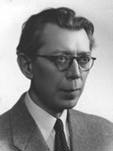|
BIOGRAPHY |
 |
||||||||||||
|---|---|---|---|---|---|---|---|---|---|---|---|---|---|
|
|
|
|
|
|
|
|
|
|
|
|
|
|
|
|
Mathieu
Debaar |
Mathieu DEBAAR (Pepinster 1895 - Verviers 1954) |
||||||||||||||||||||||||||||||||||||||||||||||||||||||||||||||||||||||||||||||||||||||||||||||||||||||||||||||
|
His
career as a violinist allowed him to perform
numerous works as a soloist, also the concertos of
Vieuxtemps and of Glazounov. The latter brought him
a medal in the class of Mathieu Crickboom at the
Conservatoire in Liège. It was in the field
of chamber music where his natural unobtrusiveness,
his reserved manner and the quality of his feelings
appear at their best. During World War I, Mathieu
Debaar founded a string quartet, together with
Messrs. Dengis, Guilleaume and Wetzels. About ten
years later, his partners were Messrs. Schneider,
Fléron and Larue. These artists undertook to
perform the major works of the classical and modern
repertoire. A third quartet set up during World War
II, with Messrs. Grosjean, Paulus and Hurard, had
the purpose of organizing concerts intended for
young people who had become somewhat disordered by
the war and of having them rediscover the genuine
wealth of the works of art. As
the head of the orchestra, he conducted many
concerts for the Schola of Verviers and the Harmony
Society. He was also the choir conductor at the
Schola of Verviers which was, originally, a mixed
choir. In this field, his activity was never more
fertile as at the "Chanterie", a mixed choir group
founded during the war. This choir organized in
1944 a concert to the memory of the 50th
anniversary of the death of Guillaume Lekeu. At
this concert and with Mathieu Debaar conducting,
the following works were performed: the
"Andromède" cantata, the "Chant de
triomphale délivrance", the "Adagio pour
quatuor d'orchestre" and the "Fantaisie sur deux
airs populaires angevins" At
the Music Conservatoire in Verviers where he became
an appointed professor in 1923, Mathieu Debaar
taught the violin and solfeggio. He discovered
there an audience that was worthy of his knowledge.
In this establishment directed at that time by
Albert Dupuis, he taught his students the very best
of his culture and of his experience. At this
school, he left the memory of a highly respected
teacher. In
1934, Mathieu Debaar was appointed a professor at
the Teachers' Training College. The entire
atmosphere was somewhat different here : the future
teachers were poorly prepared for any artistic
teaching and they frequently considered music to be
just some insignificant diversion. For the benefit
of his students, Mathieu Debaar then published a
Summary of the History of Music, soon to be
followed by a History of the Violin and by a
History of the Piano. He also designed - for the
benefit of the solfeggio courses - a Treaty of the
Chords and, toward the end of his life, he
meditated over a History of the String Quartet.
After
his excellent studies in harmony, Mathieu Debaar
was naturally tempted by composing. As a composer,
he enjoyed the benefit - via Guillaume Lekeu - of
the influence of the Schola Cantorum which he had
assimilated and adjusted to his own sensitivity as
a Walloon artist. He wrote for musical groups of
all kinds, in any and all styles. He turned to the
voices as well as to the orchestra and to a variety
of string or wind instruments, without ever
departing from his habitual talent. Mathieu
Debaar has left, among other works, one Concerto
for violin and orchestra, one Trio in D minor for
violin, cello and piano, one Sonata for trumpet and
piano, one "Legende et Caprice" for trombone and
piano, one "Piece concertante" for tuba and piano,
one "Impromptu" for flute and orchestra (or piano)
and one "Suite pour Trio d'Anches" for oboe,
clarinet and bassoon. Philippe
Bayard (d'après R. Michel) |
|||||||||||||||||||||||||||||||||||||||||||||||||||||||||||||||||||||||||||||||||||||||||||||||||||||||||||||||
|
|
|||||||||||||||||||||||||||||||||||||||||||||||||||||||||||||||||||||||||||||||||||||||||||||||||||||||||||||||
|
|
|||||||||||||||||||||||||||||||||||||||||||||||||||||||||||||||||||||||||||||||||||||||||||||||||||||||||||||||
|
|
|||||||||||||||||||||||||||||||||||||||||||||||||||||||||||||||||||||||||||||||||||||||||||||||||||||||||||||||
